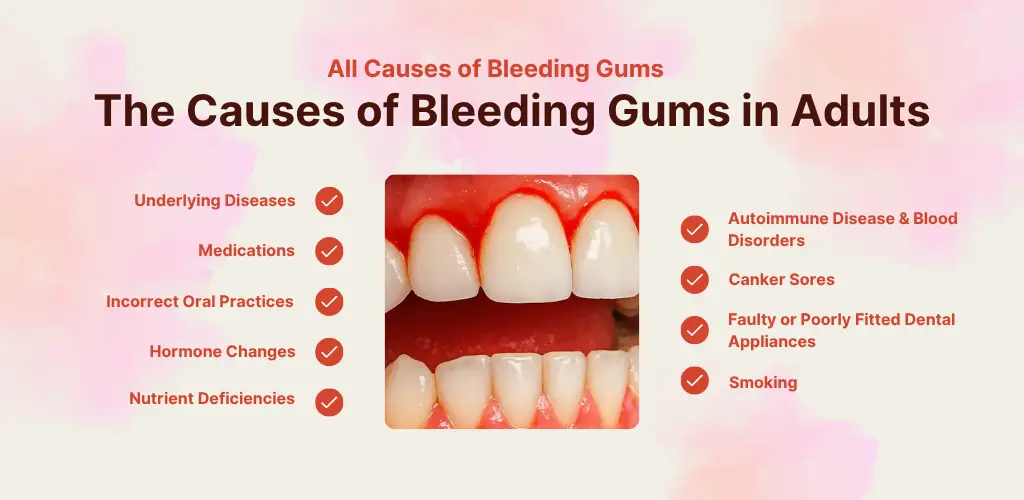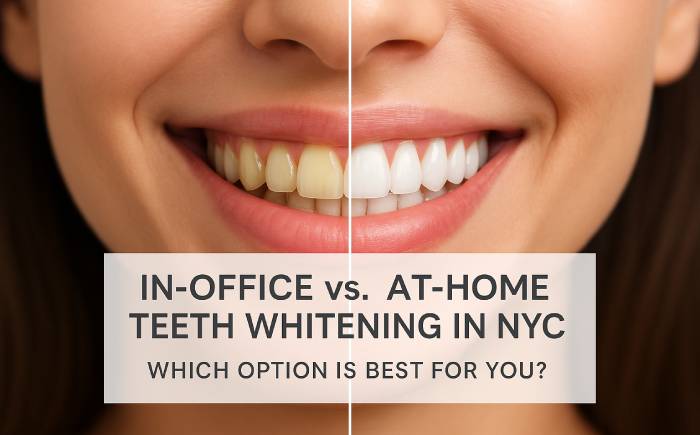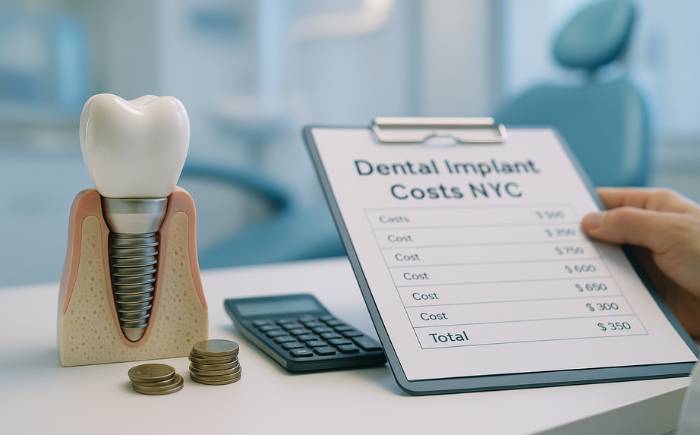9 Causes of Bleeding Gums (Besides Gum Disease)
Bleeding gums can occur for various reasons, the most common one being gum disease (Periodontitis). But what could the potential cause be if gum disease is ruled out?
When it isn’t a warning sign of gum disease, gum bleeding can be a hidden sign of another problem. Other causes of gum bleeding include deficiencies, smoking, autoimmune conditions, diseases, medications, hormonal changes, and canker sores.
Bleeding is one of the 5 signs you need a dental checkup before it’s too late! 65 Broadway Dental uses diagnostic work to find the source of the problem. Once this is done, they can prescribe medication and advice.
In this blog, we’ll explain the potential sources and how they lead to this concerning symptom.
What Deficiency Causes Bleeding Gums?
Vitamin C and K deficiencies can result in bleeding gums. A severe shortage of vitamin C causes gum bleeding, but vitamin K works differently.
Vitamin K helps to stop gum bleeding. This vitamin aids in the production of special proteins that enable quick blood clotting. Vitamin K shortages lower the production of these proteins, increasing the chances of excessive bleeding.
Also, in women, deficiencies of specific hormones can cause the gums to become sensitive and bleed.
Changing your diet and lifestyle habits can help lower the chances of deficiency-induced gum bleeds.
How to Stop Gum Bleeding Immediately
If you’re experiencing intense gum bleeding, you need a way to stop it immediately. Some methods that use pressure, cold, and salt are helpful.
“If your gums start bleeding unexpectedly, don’t panic. Instead, provide gentle care. Pressure and cold are an effective combination that restricts the blood vessels in the gums.”
— Dr. Alexander Heifitz, founder of 65 Broadway Dental NYC

Pressure & Cold Press
An ice pack covered in material held against the outside of the bleeding gums is soothing. Applying pressure to the gums with the ice pack will stop the bleeding faster.
You’ll have to keep the ice in place for at least 5 to 10 minutes to ensure the blood vessels are restricted.
Warm Saltwater Rinse
A salt-based gargling solution can also help stop gum bleeding in an emergency. A mild amount of salt (½ a teaspoon) in a large glass of warm water is enough. Repeated the process a couple of times should significantly help the situation.
What are the Causes of Bleeding Gums in Adults?
Bleeding gums are a widespread issue affecting most adults. However, the reason behind it could be simple to severe. Here are nine of the most common causes for gum bleeding.

Underlying Diseases
Various diseases have gum bleeding symptoms to alert the person to the underlying issue. While you may think it is a problem in your mouth, the cause is somewhere else in your body.
Leukemia
Leukemia is a form of cancer and a potential cause of bleeding gums. In this type of blood and bone marrow cancer, the body overproduces white blood cells or lymphocytes. These immature white blood cells originate in the bone marrow. They build up here in the bone marrow and prevent it from producing healthy cells.
Diabetes
Diabetes has a variety of side effects when untreated or not managed properly. A gum bleed is one of these signs that the disease is present. People with Type 1 or Type 2 Diabetes have a weaker immune system. They also have higher blood sugar levels. Together, poor immunity and higher sugar affect the body’s ability to fight bacteria and heal. It leads to oral infections and tooth issues, which can be characterized by gum bleeding.
Scurvy
This condition is characterized by a severe shortage of Vitamin C in the body. In scurvy patients, bleeding gums are a typical symptom that confirms the diagnosis. Along with gum issues, scurvy patients appear weak and are anemic, causing bleeding beneath the skin. It’s a rare condition, but maintaining a poor diet over time causes this condition.
Medications
A host of medications can cause bleeding gums, but blood thinners in particular cause it. These medications belong to the anticoagulation class, and their role is to slow blood clotting.
Unfortunately, most of them come with the increased risk of causing gum bleeding. Doctors may not warn patients of this side effect of blood thinners.
Anyone prescribed these medications should ask their doctor if gum bleeding is a side effect.
Incorrect Oral Practices
Ignoring dental advice and not following health hygiene practices can lead to bleeding. Using the wrong toothbrush can irritate the gums, leading to bleeding.
Brushing too roughly or too hard can damage the gums and cause them to bleed. A dentist can diagnose this issue and help by showing you the best brushing technique.
Changing your oral care routine could also cause temporary bleeding in the gums. Flossing for the first time could ‘shock’ the gums, causing them to bleed.
It takes some time to get used to. Also, it helps to adjust your technique. Slide the floss along the tooth rather than forcing it between the teeth.
Incorrect Oral Practices
Women are prone to gum bleeding and sensitivity issues when hormone levels drastically change.
This is not the first instance of a connection between dental health and the body. Dental health affects overall health, making it vital to care for your mouth, but as much for your body.
Pregnancy
Women experience a surge in estrogen and progesterone hormones while pregnant. These reproductive hormones enter the bloodstream and affect the gums. They become more reactive to infection-causing bacteria and food particles.
Menopause
Women going through menopause face challenges with their hormone production changing. Menopause triggers a reduction in estrogen levels, causing the gums to change in thickness. They also become less capable of healing, leaving them vulnerable to damage, irritation, and bleeding.
Menstruation
Many women don’t consciously notice it, but their gums become more sensitive days before their periods. This is a clear example showing that the reproductive organs influence the oral tissues.
Nutrient Deficiencies
A poor diet is one of the unexpected causes of bleeding gums in adults. The deficiency of two vitamins (Vitamin C and K) can indirectly lead to gum bleeding.


Vitamin C
Without enough Vitamin C, the body doesn’t produce collagen. Without collagen, the gums won’t be healthy or capable of supporting teeth.
Vitamin C is best found in fresh vegetables, citrus, and other fruits. Unfortunately, many people adopt diets that lack these items or use the frozen version.
Vitamin K
Vitamin K1 ensures the correct blood clotting mechanism occurs in the case of bleeding. Without it, mechanisms across the body, including the gums, won’t function as usual.
The highest sources of vitamin K come from kale, collard greens, spinach, and broccoli.
Autoimmune Disease & Blood Disorders
Genetic conditions or autoimmune diseases could cause bleeding gums. The two conditions that can cause these issues are Thrombocytopenia, Hemophilia, or Von Willebrand Disease.
Thrombocytopenia
This can be a genetic disorder or one that develops later on in life. Thrombocytopenia is when there’s a dangerously low platelet count. Platelets, also called thrombocytes, are components of the blood that are essential for blood clotting.
Hemophilia or Von Willebrand Disease
It’s a genetic disorder that is passed from one generation to another through genes. Some situations or medical conditions lead to the development of hemophilia later in life. Hemophilia is a dysfunction in the von Willebrand factor (vWF). This special protein is necessary for blood clotting.
Sjögren’s Syndrome
This autoimmune disease is connected with mouth dryness. Dry mouth causes gum irritation and bleeding. Without saliva, the mouth has less protection from bad oral bacteria. The condition affects the moisture-producing glands in the body, including the salivary glands.
Canker Sores
Everyone is bound to have experienced canker sores at some time. These are lesions that appear in the mouth. They have a white center and a red area surrounding it. They can appear on the inside of the cheeks, the tongue, or the gums.
Any contact with these lesions could cause bleeding. Simply brushing or eating a hard food can cause bleeding.
Here, the sores could be the reason behind the bleeding, not the gums. However, if the gums are sensitive and painful, it would be easy to suspect them.
Canker sores usually resolve on their own, but can reappear. Researchers can’t pinpoint a cause for canker sores. However, they are most likely to be linked to bacteria and viruses.
Faulty or Poorly Fitted Dental Appliances
Loose or poorly fitted dentures can also be the reason behind bleeding gums. Wearing away of the appliance or changes in the mouth can create fit and safety issues. Denture parts that constantly rub or cut the gums can cause bleeding.
If this is the case, it is concerning. Significant injuries are an entry point for bacteria. Bacterial infections can also lead to serious gum infections.
Dentists may suggest implant-supported dentures as the best alternative.
Smoking
Constantly using cigarettes and other tobacco products can be injurious to your health. Not just your lungs, but your mouth as well.
Excessive smoking will lead to various gum and mouth problems. The signs may start as mild sensitivity and swelling. Then they could develop into serious ones, like bleeding and sores that don’t heal, even after weeks have passed.
These are alarming symptoms as they could be a sign of oral cancer. Diagnosis and treatment can lead to chemotherapy, a cancer therapy that can lead to bleeding gums.
Are Bleeding Gums Part of Cancer Symptoms?
Extensive gum bleeding can be a symptom of cancer. You’ll want to first rule out all the smaller causes before thinking about this one.
Bleeding gums can mean many things and be caused by as many factors. It’s vital to rule out the smaller issues first, but don’t take it lightly either.
Early cancer diagnosis can be a warning sign, one that people should take note of.
Gum cancer and leukemia can cause gum bleeding. If it is cancer, there will be other warning signs:
- Loose teeth
- Swelling and pain while eating, swallowing, or moving the jaws
- Mouth ulcers or sores that don’t heal even after weeks
- Lumps or growths in the mouth
- Discoloration in the gums
- Unexplainable pain and swelling of the face
If you are experiencing pain, swelling, difficulty eating, and a lump, visit your dentist as soon as possible.
A dentist will first conduct an oral exam to gain insight into the problems. After looking, they may require additional information and tests to detect cancer.
By conducting a procedure called a biopsy, they can test the lump or growth for cancer. The important thing in such cases is to get the lump/growth tested as soon as possible.
What is the Best Bleeding Gums Treatment?
A dentist will determine the best treatment for bleeding gums based on the cause. The best treatment currently is visiting the dentist for professional care.
While you wait for your dentist appointment, there are a few options you have.
Adjust Diet, Increase Vitamin C & K Intake
Including foods rich in vitamin C and K in your diet is essential. This won’t be hard, as some foods, such as broccoli, kiwi, kale, strawberries, and spinach, contain both nutrients.
Individual sources of these nutrients are:
- Vitamin C: bell peppers, oranges, papaya, and brussels sprouts.
- Vitamin K: Leafy green vegetables, seeds, nuts, and vegetable oils.
Warm Saltwater Rinses
A homemade mouthwash solution made from salt and warm water can help. Apart from cleansing the mouth, it can work to reduce bacterial populations.
The recipe is simple: add ½ a teaspoon of salt to a glass of warm water. Repeating it several times a day can help to stop the bleeding. It has other purposes as well, making it a positive addition to your oral care routine.
Reduce Stress Level
There’s a link between stress levels and immunity. Stress leads to increased Cortisol levels. This hormone works to reduce immune functions and increase inflammation throughout the body.
Weakened immunity affects the entire body, even the gums, and so does the inflammation.
When the gums can’t fight off the infection, bleeding gums could be a result of this. Another way to look at it is that increased emotional stress can cause neglect of oral care.
Improve Oral Hygiene
Making improvements to your oral hygiene can be beneficial in many ways. Stick to brushing twice a day and flossing once a day.
Brush gently using a soft-bristle toothbrush that won’t irritate your gums. Use a mouthwash as well, but try to source one that isn’t alcohol based.
When to See a Dentist About Bleeding Gums?
Gums that bleed persistently and regularly are not normal! Also, consult a dentist or doctor immediately if other symptoms such as pain and swelling arise.
“Bleeding gums are a warning light, and ignoring it doesn’t turn it off! The best action is to schedule an appointment and let the dentist investigate the cause.”
— Dr. Alexander Heifitz, founder of 65 Broadway Dental NYC
Neglecting the issue for several weeks or months can make a difference. Some medical problems have the best prognosis when treated sooner rather than later. This is especially true for autoimmune conditions and serious diseases like cancer.
The sooner the issue is diagnosed, the better the treatment and outcome. Also, if it is gum disease, early treatment can help prevent tooth loss and cavities.
If you are experiencing gum bleeding and other dental issues, consult a dentist immediately. Note that although a cold press stops the bleeding for the moment, it’s not a solution. It’s definitely not a substitute for professional healthcare.
What Happens if You Don't Treat Bleeding Gums?
There’s evidence emerging about the connection between dental health and the body. Experts warn that bad oral health affects your brain and determines your risk of cognitive decline. This includes conditions like dementia and Alzheimer’s disease.
Bleeding gums can be a sign of a more serious disease or health hazard. Leaving it untreated can lead to the following:
- Addressing gum bleeding from periodontitis may reduce plaque buildup in the heart’s arteries.
- Maintaining oral health can help manage diabetes.
- Gum disease in pregnant women can lead to premature delivery and low birth weight.
- There isn’t scientific proof yet, but experts say cancer and periodontal disease are linked.
These potential realities show why treating gum bleeding is actually a preventive measure. It stops serious health issues from manifesting and becoming life-threatening.
Conclusion
Any case of gum bleeding causes concern. However, when the bleeding is extensive and regular, it becomes more concerning.
Besides gum disease, bleeding gums signal another disease, a medication side effect, poor oral care practices, hormonal changes, and more.
If it’s happening too often and you can’t figure out why, the team at 65 Broadway Dental can help. It can potentially take one dental visit to identify the issue and start correcting it!
FAQs
1. What are two early signs of gum disease?
The two earliest signs of gum disease are sensitivity and bleeding gums. These two symptoms often come with another symptom, gum swelling.
2. What autoimmune or genetic disease causes bleeding gums?
Autoimmune diseases are characterized by the body’s tendency to attack its own cells, not defending them. Thrombocytopenia, Hemophilia, and Sjögren’s Syndrome are autoimmune or genetic diseases that cause bleeding in the gums.
3. Which food deficiency causes bleeding of the gums?
A lack of fresh fruits and vegetables, dairy products, and nuts can cause gum bleeding. Among
4. Why are my gums suddenly bleeding?
Gum bleeding can begin ‘out of the blue’ for various reasons. Finding the cause is essential to permanently solving it. Reasons could include diet deficiencies, hormonal changes, disease, medications, or oral sores.
5. What deficiency causes bleeding gums?
A deficiency of vitamin C and vitamin K can lead to gum bleeding. A severe shortage of vitamin C causes scurvy, a disease known for gum bleeding.

Dr. Alexander Heifitz (Author)
Dr. Alexander Heifitz is the founder of 65 Broadway Dental in NYC, where he combines advanced dental expertise with a patient-first approach. He specializes in cosmetic and restorative treatments such as dental implants, veneers, Invisalign, and smile makeovers, helping New Yorkers achieve both oral health and confidence.
Booking An Appointment
Looking for a reliable dentist in Downtown NYC? Whether you need a routine cleaning, urgent care, or a full smile transformation — we’ve got you covered. We accept most PPO insurance plans and offer flexible scheduling.
+1 (212) 430-3888
Call for appointment
Walk-ins Welcome / Same-Day Appointments Available

Related Blogs

In-Office vs At-Home Teeth Whitening in NYC
Discover the best teeth whitening in NYC as we compare in-office and at-home options for a brighter, more confident smile.
Read More
How Much Do Dental Implants Cost in NYC? | Affordable Options Explained
Discover how much dental implants cost in NYC, what factors affect pricing, and explore affordable options without compromising quality.
Read More